Our indexes include entries for the spelling seth. In the period you have requested, we have the following 57 records (displaying 1 to 10):
Inhabitants of Colchester (1471)
Inhabitants of Colchester, Essex, swearing fealty to the Crown, as recorded in the Red Paper Book.
| Sample scan, click to enlarge
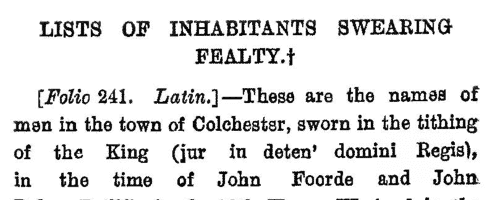
|
Inhabitants of Stratford upon Avon in Warwickshire
(1406-1535)
The Hospital of the Holy Cross was founded in 1269; in time this fraternity became a social and religious gild. 'The Register of the Gild of the Holy Cross, the Blessed Mary and St John the Baptist of Stratford-upon-Avon' was edited by J. Harvey Bloom, rector of Whitchurch, and printed in 1907. The register is a record of admissions to the gild, an account of the fines paid by new members, and the names of those in arrear. Each year's record usually starts on the Monday after Ascension Day (the sixth Thursday after Easter), when the new aldermen, master and proctors of the gild were elected, all duly named. Then follow the admissions to the gild, including payments for prayers and candles (lights) for the faithful dead; and the names of the sureties for these payments. Interspersed with this are occasional proclamations and memoranda concerning the fraternity. A peculiarity of this publication is that the years given at the head of each page (e. g. 1502-3) are those of the regnal year (in that case 18 Henry VII) in which the Monday after Ascension Day fell. The regnal years of Henry IV, Henry VI, Richard III and Henry VII all started after that day in the calendars of 1399, 1422, 1483 and 1485; so the gild registers during those years actually cover the following year to that shown in this printed text (in that case, 1503-4).
| Sample scan, click to enlarge
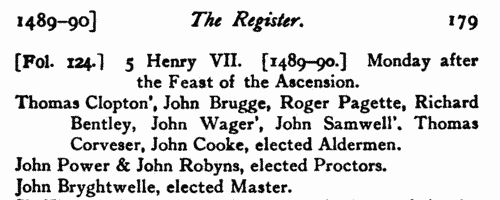
|
Liegemen and Traitors, Pirates and Spies
(1556-1558)
The Privy Council of king Philip and queen Mary was responsible for internal security in England and Wales, and dealt with all manner of special and urgent matters
| Sample scan, click to enlarge

|
Cecil Manuscripts
(1540-1571)
Letters and papers of the Earl of Hertford and (1551-1571) sir William Cecil, Secretary of State. Also includes some miscellaneous material as early as 1306. | Sample scan, click to enlarge
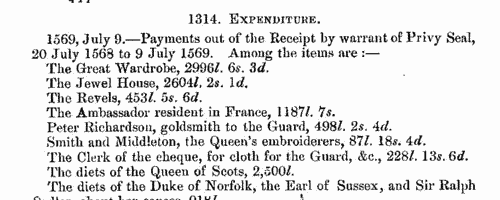
|
Treasury and Customs Records
(1685-1688)
Government accounts, with details of income and expenditure in Britain, America and the colonies
| Sample scan, click to enlarge
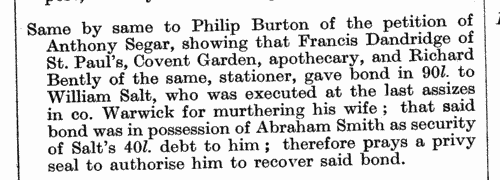
|
Official Papers
(1697)
The State Papers Domestic cover all manner of business relating to Britain, Ireland and the colonies, conducted in the office of the Secretary of State as well as other miscellaneous records. Includes lists of passes to travel abroad.
| Sample scan, click to enlarge
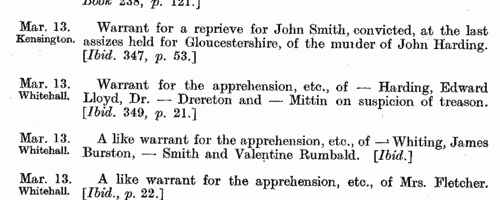
|
 Apprentices registered at Norwich in Norfolk
(1713-1715) Apprentices registered at Norwich in Norfolk
(1713-1715)
Apprenticeship indentures and clerks' articles were subject to a 6d or 12d per pound stamp duty: the registers of the payments usually give the master's trade, address, and occupation, and the apprentice's father's name and address, as well as details of the date and length of the apprenticeship. There are central registers for collections of the stamp duty in London, as well as returns from collectors in the provinces. These collectors generally received duty just from their own county, but sometimes from further afield. July 1713 to April 1715. (The sample entry shown on this scan is taken from a Norfolk return) | Sample scan, click to enlarge

|
 Masters and Apprentices
(1721) Masters and Apprentices
(1721)
Apprenticeship indentures and clerks' articles were subject to a 6d or 12d per pound stamp duty: the registers of the payments usually give the master's trade, address, and occupation, and the apprentice's father's name and address, as well as details of the date and length of the apprenticeship. 2 January to 26 August 1721. | Sample scan, click to enlarge

|
 Masters and Apprentices
(1724) Masters and Apprentices
(1724)
Apprenticeship indentures and clerks' articles were subject to a 6d or 12d per pound stamp duty: the registers of the payments usually give the master's trade, address, and occupation, and the apprentice's father's name and address, as well as details of the date and length of the apprenticeship. 4 May to 31 December 1724. | Sample scan, click to enlarge

|
 Masters and Apprentices
(1736) Masters and Apprentices
(1736)
Apprenticeship indentures and clerks' articles were subject to a 6d or 12d per pound stamp duty: the registers of the payments usually give the master's trade, address, and occupation, and the apprentice's father's name and address, as well as details of the date and length of the apprenticeship. 2 January to 11 December 1736 | Sample scan, click to enlarge

|
Research your ancestry, family history, genealogy and one-name study by direct access to original records and archives indexed by surname.












